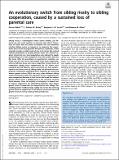An evolutionary switch from sibling rivalry to sibling cooperation, caused by a sustained loss of parental care
Abstract
Sibling rivalry is commonplace within animal families, yet offspring can also work together to promote each other’s fitness. Here we show that the extent of parental care can determine whether siblings evolve to compete or to cooperate. Our experiments focus on the burying beetle Nicrophorus vespilloides, which naturally provides variable levels of care to its larvae. We evolved replicate populations of burying beetles under two different regimes of parental care: Some populations were allowed to supply posthatching care to their young (Full Care), while others were not (No Care). After 22 generations of experimental evolution, we found that No Care larvae had evolved to be more cooperative, whereas Full Care larvae were more competitive. Greater levels of cooperation among larvae compensated for the fitness costs caused by parental absence, whereas parental care fully compensated for the fitness costs of sibling rivalry. We dissected the evolutionary mechanisms underlying these responses by measuring indirect genetic effects (IGEs) that occur when different sibling social environments induce the expression of more cooperative (or more competitive) behavior in focal larvae. We found that indirect genetic effects create a tipping point in the evolution of larval social behavior. Once the majority of offspring in a brood start to express cooperative (or competitive) behavior, they induce greater levels of cooperation (or competition) in their siblings. The resulting positive feedback loops rapidly lock larvae into evolving greater levels of cooperation in the absence of parental care and greater levels of rivalry when parents provide care.
Citation
Rebar , D , Bailey , N W , Jarrett , B J M & Kilner , R M 2020 , ' An evolutionary switch from sibling rivalry to sibling cooperation, caused by a sustained loss of parental care ' , Proceedings of the National Academy of Sciences of the United States of America , vol. 117 , no. 5 , pp. 2544-2550 . https://doi.org/10.1073/pnas.1911677117
Publication
Proceedings of the National Academy of Sciences of the United States of America
Status
Peer reviewed
ISSN
0027-8424Type
Journal article
Description
Funding: Consolidator’s Grant from the European Research Council to R.M.K.(310785 Baldwinian_Beetles). N.W.B. was supported by the UK Natural Environment Research Council (NE/L011255/1).Collections
Items in the St Andrews Research Repository are protected by copyright, with all rights reserved, unless otherwise indicated.

